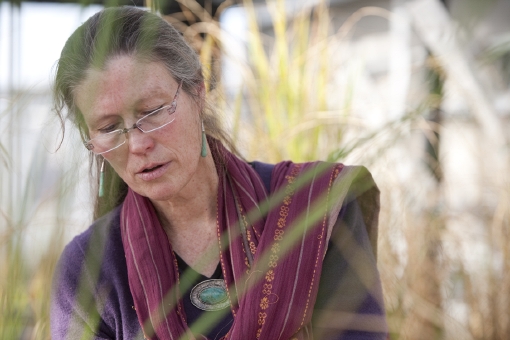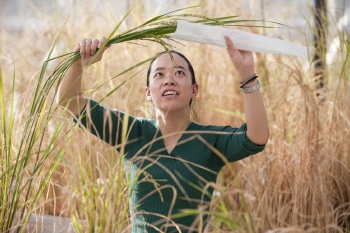COVER STORY
New tricks for a very old crop:
Working across disciplines, rice researchers on campus are finding novel ways to head off global food shortages
Mounting challenges to the world's rice crop, from insufficient yields to climate change, are engaging the international scientific community. Some solutions are on the horizon, thanks to work by researchers from across disciplines at Cornell, who are weeding through the past to ensure this vital crop's future.

Susan McCouch, professor of plant breeding and genetics, examines rice plant cultivars in a campus greenhouse. Video interview with Susan McCouch
That past is embodied in wild rice strains, which are the ancestors of cultivated rice, but until recently rice breeders would never have dreamed of crossing these progenitors with cultivated rice. Wild rice strains are considered weeds with undesirable traits – for example, they hold just a few, thin reddish seeds that easily fall off their panicles.

Janelle Jung, a plant breeding graduate student in McCouch's lab, bags rice plant panicles to prevent cross pollination. See larger image
But when Cornell plant geneticist Susan McCouch identified yield-related genes from a type of wild rice, and her collaborators at the National Rice Research Center in Stuttgart, Ark., bred those wild yield genes into a widely planted U.S. long grain called Jefferson, the resulting offspring was a sturdy new variety that withstood the onslaught of Hurricane Ike in 2008 while outperforming the Jefferson parent's yields by a whopping 20 percent.
Collaborators in China, Indonesia, Brazil, Korea and Sierra Leone have had similar results with their varieties, breeding in favorable yield alleles (gene variants) from wild rice and getting 15 to 20 percent yield advantages in field trials all over the world.
<<View entire story as one page>>